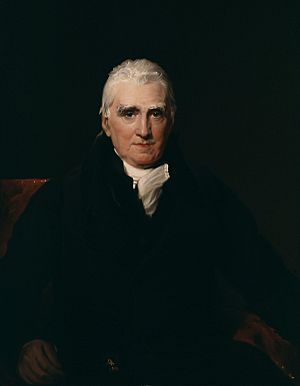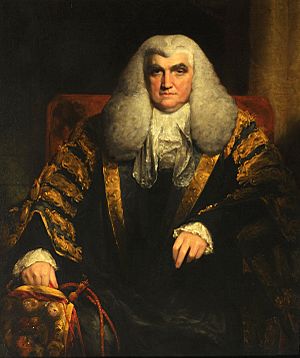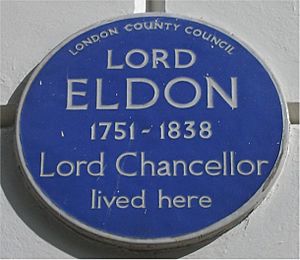John Scott, 1st Earl of Eldon facts for kids
Quick facts for kids
The Earl of Eldon
|
|
|---|---|
 |
|
| Lord High Chancellor of Great Britain | |
| In office 1 April 1807 – 12 April 1827 |
|
| Prime Minister | |
| Preceded by | The Lord Erskine |
| Succeeded by | The Lord Lyndhurst |
| In office 14 April 1801 – 7 February 1806 |
|
| Prime Minister | |
| Preceded by | The Lord Loughborough |
| Succeeded by | The Lord Erskine |
| Personal details | |
| Born | 4 June 1751 Newcastle upon Tyne, England |
| Died | January 13, 1838 (aged 86) London, England |
| Political party | Tory |
| Spouse |
Elizabeth Surtees
(m. 1772; died 1831) |
| Alma mater | University College, Oxford |
John Scott, 1st Earl of Eldon (born 4 June 1751 – died 13 January 1838) was an important British lawyer and politician. He held the very high position of Lord High Chancellor of Great Britain twice. First, from 1801 to 1806, and then again from 1807 to 1827. He was known for his strong beliefs and long service in government.
Contents
Early Life and Education
Family Background
John Scott was born in Newcastle upon Tyne, England. His grandfather, William Scott, worked as a clerk for a coal merchant. His father, also named William, started as an apprentice in the coal business. He later became a successful merchant and built up a good amount of wealth for the family.
School Days and University
John Scott went to Newcastle upon Tyne Royal Grammar School. He had an amazing memory, which helped him do well in his studies. At first, his father wanted him to join the family coal business. However, John's older brother, William, who was already studying at University College, Oxford, convinced their father that John should continue his education.
So, in 1766, John Scott went to University College, Oxford. He planned to become a priest. The next year, he earned a fellowship, which is like a scholarship. He graduated with a Bachelor of Arts degree in 1770. In 1771, he won a university prize for an English essay, showing his writing skills.
A Secret Marriage
John fell in love with Elizabeth "Bessie" Surtees, the daughter of a banker from Newcastle. Her family did not approve of their relationship and tried to stop them from marrying.
But John and Bessie were determined. On 18 November 1772, John helped Bessie escape from her father's house. They traveled across the border to Scotland, where they got married. John's father was not happy about the timing of the marriage. He worried it would hurt John's chances of becoming a priest and keeping his fellowship. However, he was kind to the young couple and gave his son £2,000.
John and Bessie returned to Oxford. John kept his fellowship for a year after marrying and earned extra money by tutoring students. After some time, Bessie's father accepted their marriage and gave them £3,000.
Since no church jobs became available, John decided to leave his path to becoming a priest. He chose to study law instead. He began his law studies in January 1773 and became a lawyer in 1776. He soon moved to London to practice law, where he found great success.
Political Career
Becoming a Successful Lawyer
John Scott's legal career began to shine in his second year as a lawyer. His brother William, who was a professor at Oxford, helped him meet important people in London. John was hired for a big case involving an election. Even though he lost the case, he showed off his talents.
In 1780, his career really took off with a case called Ackroyd v Smithson. He argued the case strongly, even when others thought he should give up. He won the appeal, impressing a powerful judge named Lord Thurlow. From then on, his success was clear.
In 1782, he became a "King's Counsel," which is a special title for experienced lawyers. This meant he was on his way to becoming very wealthy. He worked hard and became very successful in different areas of law.
Entering Parliament
In 1782, John Scott became a Member of Parliament (MP) for a small town called Weobley. He supported Pitt, who was a leading politician. His first speeches in Parliament were not very good, and he was even made fun of by another MP. But he learned from this experience.
In 1788, he was made Solicitor General and received the title of "Sir." He played a key role in drafting a bill about the king's power when King George III was ill. In 1793, Sir John Scott became Attorney-General. In this role, he led important legal cases against people accused of treason. He believed he was doing the right thing to protect the country.
Becoming Lord High Chancellor
In 1799, Sir John Scott became the chief judge of the Court of Common Pleas. He also joined the House of Lords as Baron Eldon.
In 1801, he became the Lord High Chancellor of Great Britain. This is one of the highest legal offices in the country. He was chosen partly because of his strong views against giving more rights to Roman Catholics. He served as Lord Chancellor for five years.
After a short break, Lord Eldon returned to the role of Lord Chancellor in 1807. He held this position for about 20 more years. During this time, he was highly respected for his work in developing fair legal principles.
In 1827, he finally resigned from his position. He was 76 years old. He left because he strongly disagreed with the new Prime Minister, George Canning, who supported giving more rights to Roman Catholics.
Even after resigning, Lord Eldon hoped to be part of the government again. He spoke in Parliament for the last time in July 1834.
In 1821, King George IV made Lord Eldon an Earl, giving him the title Viscount Encombe and Earl of Eldon. This was partly because Lord Eldon supported the King in his personal life and shared his views against Roman Catholics. His brother, William, also became a peer, known as Lord Stowell.
Personal Life
Lord Eldon's wife, Elizabeth, whom he called Bessie, passed away in 1831. They had two sons and two daughters who lived to adulthood:
- John (1774–1805) married Henrietta Elizabeth Ridley. They had one son, John, who later inherited his grandfather's title.
- William Henry John (died 1832) never married.
- Lady Elizabeth Repton John (1783–1862) married George Stanley Repton.
- Frances Jane (died 1838) married Rev. Edward Bankes. They had two sons.
Lord Eldon lived longer than most of his close family members. His brother William died in 1836. Lord Eldon himself passed away in London on 13 January 1838. He left a very large fortune, showing how successful he had been.
His title then went to his eldest grandson, John.
There is a blue plaque on his former house in Bedford Square, London, marking its historical importance. Lord Eldon and his wife are buried in the churchyard in Kingston, Dorset.
Legacy
Views on War and Peace
Lord Eldon was a strong supporter of the war against Napoleon. However, when a new war seemed possible in 1823, he shared a different thought: "People trick themselves into thinking that war is just a proclamation, a battle, a victory, and a triumph. They don't think about the soldiers' widows and orphans after the fathers and husbands have died in battle."
Political and Legal Ideas
Lord Eldon believed strongly in the existing government system. He was known for not wanting to change things. For example, he was criticized for not making the Court of Chancery faster. This court was known for being very slow.
Some people felt that he never introduced any new laws that helped the country. They also thought he always opposed new ideas. He was seen as someone who wanted to keep Britain exactly as it was, based on older traditions.
In 1831, while returning from an election event, he was hit by stones thrown by a crowd. Luckily, he was not seriously hurt. He was a strong opponent of the Great Reform Act, which aimed to change how Parliament worked.
See also
- Charles Dickens
- Circumlocution Office
- Charles Wetherell
Important Legal Cases
Here are some of the important legal cases that Lord Eldon was involved in or made decisions on:
- Ackroyd v Smithson
- Evans v Bicknell (1801) 6 Ves Jun 173
- Ex parte James (1803) 8 Ves 337
- 17 Ves 320
- Higginbotham v Holme 19 Ves 88
- Lucena v Craufurd (1806) 2 Bos & PNR 269
- Carlen v Drury (1812) 1 Ves & B 154
- Gee v Pritchard (1818) 2 Swans 402
- Gordon v Gordon (1821) 3 Swan 400
- William Lawrence's suit for copyright (1822)
Vessels Named for Lord Eldon
Several ships were named in his honor, including:
- Earl of Eldon
- Lord Eldon
- The East Indiaman Lord Eldon
 | John T. Biggers |
 | Thomas Blackshear |
 | Mark Bradford |
 | Beverly Buchanan |



